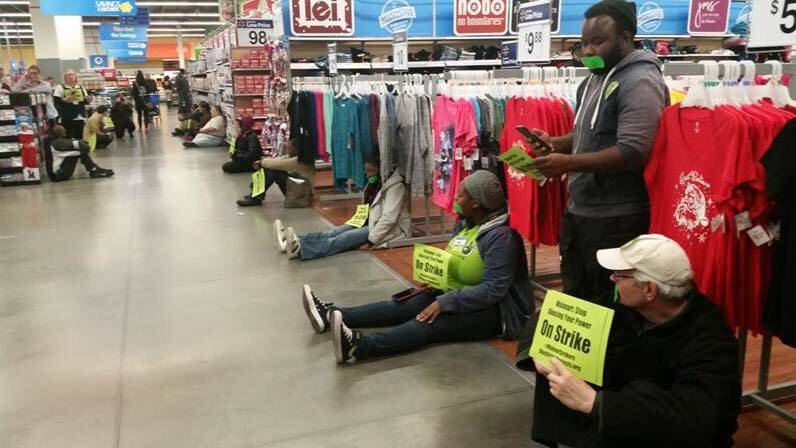I recently sat down with actor Ed O’Neill, best known for his role as Al Bundy in the Fox TV Network sitcom, Married With Children, and who is currently starring in ABC’s award-winning comedy, Modern Family, which will be honored next week at the Los Angeles Alliance for a New Economy’s 2014 City of Justice Awards Dinner. Here’s the second in a series of clips from that interview. (Full transcript here.)
» Read more about: Watch Now: Actor Ed O’Neill on His Teamster Roots »


California pension cutters suffered another setback last week when a state appellate court rejected their claims that ballot language written by Attorney General Kamala Harris showed political bias.
The decision by Sacramento’s 3rd District Court of Appeal “dismissed as moot” San Jose Mayor Chuck Reed’s appeal of a lower court ruling. This effectively leaves in place Sacramento Superior Court Judge Allen Sumner’s March decision that Reed had failed to prove Harris’ ballot summary was misleading.
“We’re not going to get a hearing on the merits,” Reed told Capital & Main. “It shows how difficult it is to try to get through the court system in an election cycle; it means you have to start earlier.”
Legally, the two rulings sound a final death knell for Reed’s contentious statewide campaign to put his self-described Pension Reform Act of 2014 before California voters. In practical terms,
» Read more about: Pension Cutters Lose in Court, Vow 2016 Ballot Bid »


Little Joe had two cowboys, two kings and there was a third king face up on the table. They were playing Texas Hold’em and it had turned up on the flop—the first three cards laid down with two more to go. These were the common cards each player could try and make a hand. In Hold’em, you could play only one card of your two down ones or, if everybody had crap, all could play the five that eventually wound up in the middle of the table. At the moment, his three kings was a pretty good hand to have.
“I’ll see you fifty and I’ll bump it fifty,” Joanie Kriss said confidently. Of the three cards face up on deck, two were clubs. That might mean she had two clubs of her own and was chasing the fifth card in suit to make a flush … or was bluffing. The stakes were not Vegas level;
» Read more about: The Dixon Family Chronicles: “No Justice …” »


“California pension funds are running dry,” warned a recent Los Angeles Times headline.
“The unfunded liability— that’s the difference between promised benefits and projected funds to fulfill those obligations — grew from about $6.3 billion in 2003 to a little more than $198 billion in 2013,” Santa Rosa’s Press Democrat chimed in, helpfully doing the math to point out that’s a 30-fold increase in 11 years.
“The system, in short, is completely, utterly broken,” concluded the Orange County Register.
Despite nothing significant changing in the retirement plans themselves, public employee pensions are back in the news, and apparently panic is in the air.
Why? In late October State Controller John Chiang posted data on 130 state and local pension funds as part of his new By the Numbers website.
» Read more about: California Pensions: Encouraging News v. Scary Headlines »
Steve Clemons is Washington editor-at-large for The Atlantic, whose spin-off site, CityLab, covers new ideas and issues facing urban metro areas worldwide. Each year CityLab convenes a gathering of global city leaders in person to discuss innovative ideas and projects that are emerging in urban communities. This year CityLab’s conference was held at the Ace Hotel in downtown Los Angeles. Shortly afterward, Capital & Main spoke to Clemons. In this video clip he speaks of L.A.’s past and its new allure.
Also Watch: Steve Clemons on Government
» Read more about: Steve Clemons on L.A.’s Hard Times and Unbelievably Cool Hybrid Stuff »



Walmart won’t pay its employees enough to afford Thanksgiving dinner, so they’re holding food drives for their employees. Seriously. It’s been reported that an Oklahoma City Walmart set up bins for underpaid associates to donate canned goods to other underpaid associates.
Walmart workers have a better idea: Pay us enough to put food on the table.
On Black Friday, the busiest shopping day of the year, tens of millions of Americans will travel to Walmart stores to look for holiday discounts on computers, toys and cellphones as well as to buy groceries and basic household items. But at more than 1,600 of Walmart’s 4,000 stores, shoppers will be greeted by Walmart employees handing out leaflets and holding picket signs — “Walmart: Stop Bullying, Stop Firing, Start Paying” and “We’re Drawing a Line at the Poverty Line: $25,000/year” — protesting the company’s abusive labor practices, including poverty-level wages,
» Read more about: Black Friday Protests Push Back Against Walmart »


On November 13, Walmart associates in Los Angeles kicked off this year’s Black Friday strikes by sitting down in the aisles of the Crenshaw Walmart store to protest Walmart’s alleged intimidation. Later that evening 23 workers and community members were arrested at the Pico Rivera store.
But that’s just the beginning. This Black Friday, Walmart workers are striking again on the biggest shopping day of the year. Walmart associates are sick of struggling to get by while working for a company owned by the world’s wealthiest family. The Walton family that controls Walmart has more wealth than 43 percent of Americans combined, a perfect picture of everything that’s wrong with our unequal economy.
Walmart associates are striking to stop retaliation against workers who exercise their rights and to call on the company to publicly commit to paying $15 an hour and providing full-time work.
As Los Angeles and the Los Angeles Alliance for a New Economy (LAANE) work to raise the wage for all Angelenos,
» Read more about: Walmart Strikers: ‘All Out on Black Friday!’ »


From boiling the soon-to-be-mashed potatoes to rinsing the fruits and vegetables, clean water is an essential ingredient in every household that will be preparing Thanksgiving dinner.
And yet, the absence of adequate federal support means our public water systems are under threat. Over the next 20 years, U.S. water systems will likely require a staggering $2.8 to $4.8 trillion investment, and for-profit corporations such as Veolia and Suez are jumping at the opportunity to privatize America’s water supply so they can pocket a portion of those trillions we’ll need to spend.
A new report released by Corporate Accountability International with Public Services International Research Unit (PSIRU), shows that promises made by private water corporations fail to materialize or come at the expense of deferred infrastructure maintenance, skyrocketing water rates and risks to public health.
The good news, however, is that cities across the country and all over the world are increasingly rejecting water privatization and are taking back public control of their water systems.


In a dramatic turnaround to what only last month was described as a hopeless impasse, Los Angeles Mayor and L.A. County Metropolitan Transportation Authority (Metro) Chair Eric Garcetti announced Tuesday that an agreement has been reached between Kinkisharyo International, LLC and labor and community groups to expand its L.A. County manufacturing operations for its next delivery of Metro light rail cars.
The mayor’s office said the agreement will net the county a total of 250 new jobs as Kinkisharyo expands the light rail car assembly and testing operations at its existing plant in Palmdale. The accord also includes a “neutrality agreement” (stating Kinkisharyo won’t contest attempts to unionize its workforce), as well as a commitment to explore additional skills training and assistance for disadvantaged L.A. County workers.
The agreement covers a total of 175 cars slated for assembly at the facility, including the 78 that Kinkisharyo is currently assembling under a 2012 Metro contract,
» Read more about: Rail Car Pact to Bring Jobs to L.A. County »
Earlier this month I sat down with actor Ed O’Neill, best known for his role as Al Bundy in the Fox TV Network sitcom, Married With Children, and who is currently starring in ABC’s award-winning comedy, Modern Family, which will be honored in December at the Los Angeles Alliance for a New Economy’s 2014 City of Justice Awards Dinner. Here’s the first in a series of clips from that interview. (Full transcript here.)
» Read more about: Watch Now: Ed O’Neill on Pushing America’s Hot Buttons »